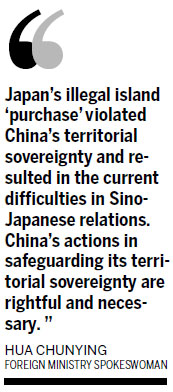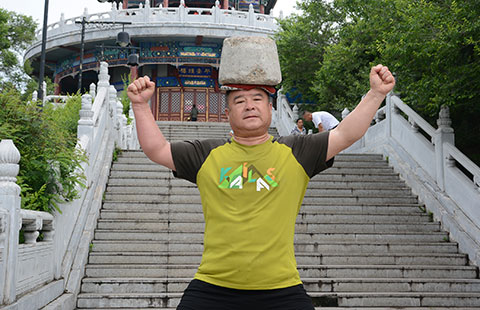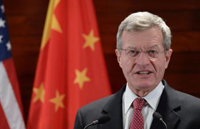Beijing warns Tokyo not to destabilize region
By Cheng Guangjin (China Daily) Updated: 2012-11-24 00:16Japan is urged not to do anything that will harm regional security and stability as right-wing forces rise in the country ahead of an election next month, a Foreign Ministry spokeswoman said on Friday.
Japan should review its own acts to see whether they benefit regional peace and stability, Hua Chunying said.
Hua made the remarks in response to a recent comment from Japan's Liberal Democratic Party Leader Shinzo Abe, who attributed the reason for tensions in Sino-Japanese relations to the increase in China's defense budget and its stance on the Diaoyu Islands dispute.
 |
"Japan's illegal island 'purchase' violated China's territorial sovereignty and resulted in the current difficulties in Sino-Japanese relations," Hua said at a regular news conference.
"China's actions in safeguarding its territorial sovereignty are rightful and necessary," she added.
In recent years, Japan has been enhancing military capabilities and alliances and sowing discord in regional security issues, all of which have drawn the attention of regional countries and the international community, Hua said.
Analysts warned of signs of a rightward shift in Japanese politics that will threaten regional peace and stability.
The LDP unveiled on Wednesday a series of policy priorities, including pledges to look at establishing a permanent presence on the islands, which are at the center of a row with China.
It also promised a review of the self-imposed ban on defending allies and raised the possibility of Japanese troops returning fire if US forces come under attack.
Polls suggest that the LDP is likely to become the biggest party in the election scheduled for Dec 16. Japanese Prime Minister Yoshihiko Noda dissolved parliament and called for a general election next month.
If the LDP's policies are to be put into force, Japan will be a threat to countries in this region, with its Self-Defense Forces turned into an offensive armed force, said Liu Dake, a Hong Kong commentator.
Liu compared the situation in Japan today with that of pre-World War II Germany, which had to deal with restrictions set by other countries, and has new nationalist sentiments in addition to serious economic problems.
Japan's economy contracted in the third quarter of this year, foiling hopes of a rebound and signaling to many economists it may already be in recession, The Associated Press reported.
"The upcoming election is crucial as it matters whether Japan will continue with the 'peace constitution', stick to the post-World War II world order, or ruin peaceful development in East Asia," Liu said.
Developments in Japan also have drawn cautionary words from South Korea's foreign minister.
Yonhap news agency quoted Kim Sung-Hwan as saying at a business forum in Seoul on Thursday: "Overall, the political situation in Japan is showing signs of a rightward shift, and some say Japan is increasingly becoming nationalistic.
"Japan is becoming more conservative and aggressive over territorial matters and (we) need to watch out for that."
South Korea is currently locked in a dispute with Japan over several isolated islands.
- China rejects Japan's 'control' of Diaoyu waters
- Diaoyu tension takes toll on Japan's economy
- 'Defending Diaoyu Islands' game
- China not recognize Japan's 'control' of Diaoyu Islands
- 4 Chinese ships patrol near Diaoyu Islands
- Chinese envoy to EU rejects Japan's Diaoyu claims
- China confirms latest Diaoyu Islands sea patrol
- What you need to know about Jiangsu's deadly tornado
- China faces challenges in tornado forecast: weather authority
- Ruling may 'open Pandora's box'
- Poverty funds facing stiffer supervision
- Guns a growing factor in narcotics enforcement
- China issues disaster alerts
- Ministry orders removal of substandard running tracks
- HK most expensive for expats
- Agency lists tiny hallway for sale: 1.5 million yuan
- Li vows to boost support for real economy










